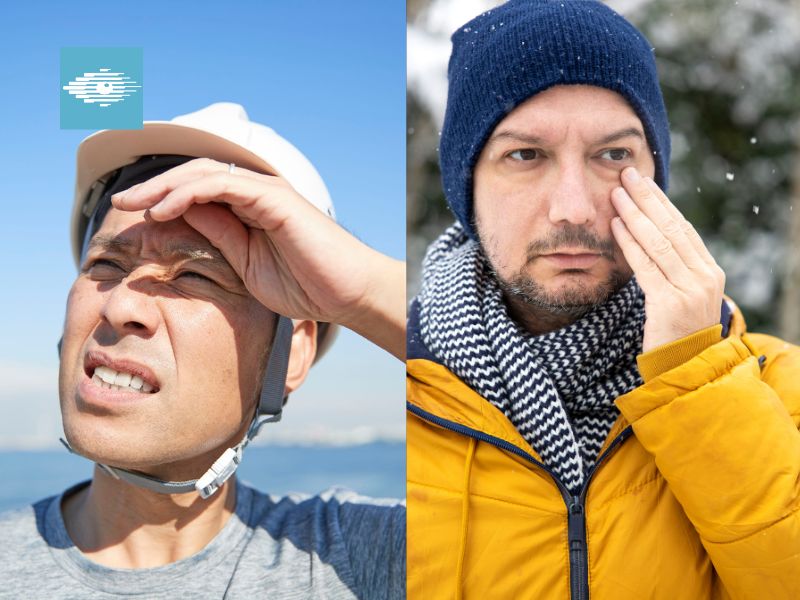What is the Difference Between Summer and Winter Eyes?
As the seasons change, so do many aspects of our health—including our eye health. Understanding the difference between summer and winter eyes is essential for maintaining optimal vision year-round. Whether you’re enjoying a sunny day at the beach or bundled up in winter gear, knowing how seasonal variations affect your eyes can help you take better care of them. In this article, we’ll explore what sets summer eyes apart from winter eyes and share some practical summer eyecare tips to keep your vision clear and comfortable.
Understanding Summer Eyes
Summer eyes refer to the common eye conditions and symptoms people experience during the warmer months. Increased exposure to sunlight, higher temperatures, and outdoor activities can all impact your eyes in distinct ways.
Increased UV Exposure
One of the biggest challenges for summer eyes is the increased exposure to ultraviolet (UV) rays. UV radiation from the sun can cause damage to the cornea and lens, potentially leading to long-term eye problems like cataracts and macular degeneration. This makes proper protection during summer months critical.
Dryness and Irritation
Despite the season, dry eyes can be a problem in summer too. Hot weather, wind, and air conditioning can reduce tear production or cause tears to evaporate faster, leading to irritation and redness. This is why summer eyecare often emphasizes keeping eyes hydrated and protected from environmental stressors.
Allergies and Allergic Conjunctivitis
Summer is also a peak time for allergies. Pollen, dust, and mold spores in the air can trigger allergic conjunctivitis, causing itching, redness, and watery eyes. These allergic reactions can be especially bothersome for those predisposed to seasonal allergies.
Practical Summer Eyecare Tips for Healthy Summer Eyes
- Wear sunglasses that block 100% of UVA and UVB rays to safeguard your eyes from harmful sun exposure.
- Use lubricating eye drops to prevent dryness caused by heat and air conditioning.
- Avoid rubbing your eyes, especially during allergy season, to reduce irritation.
- Consider wearing wide-brimmed hats when outdoors for additional shade and protection.
- Stay hydrated to maintain your natural tear production.
The Characteristics of Winter Eyes
Winter eyes, on the other hand, relate to eye issues more commonly experienced during colder months. The drop in temperature and humidity can lead to different challenges compared to summer.
Dry, Itchy, and Irritated Eyes
Cold weather often brings dry indoor air due to heating systems that can dry out your eyes. This can lead to discomfort, redness, and a gritty sensation often described by people with winter eyes. Dry eye syndrome tends to peak in winter months for this reason.
Decreased Blink Rate
During winter, when it’s cold outside, people tend to blink less frequently, especially when staring at screens indoors. Reduced blinking can worsen dryness and irritation, making winter eyes more uncomfortable.
Potential for Eye Infections
The combination of cold weather and indoor crowding can increase the risk of viral and bacterial eye infections. Touching eyes with unwashed hands or exposure to contaminated items can exacerbate this.
Protection in Winter
While UV exposure might be lower compared to summer, reflective surfaces like snow can still emit harmful UV rays, so protecting your eyes remains crucial.
How to Care for Your Eyes Year-Round
While summer eyecare focuses heavily on UV protection and hydration to combat heat and allergens, winter eyecare is about keeping the eyes moist and preventing dryness caused by cold, dry air.
Universal Tips for Healthy Eyes Throughout the Seasons
- Use a humidifier indoors during dry winter months to maintain moisture in the air.
- Follow the 20-20-20 rule (every 20 minutes, look 20 feet away for 20 seconds) to reduce eye strain.
- Maintain a balanced diet rich in omega-3 fatty acids and antioxidant vitamins to support eye health.
- Schedule regular eye check-ups to monitor any changes or issues.
- Avoid smoking and minimize exposure to irritants that aggravate eye conditions.
Final Thoughts
The difference between summer and winter eyes primarily lies in how environmental factors during each season affect eye health. Summer eyes are more prone to UV damage, dryness from heat and air conditioning, and allergic reactions. Winter eyes, meanwhile, tend to suffer from dryness due to cold, dry air and decreased blinking. By understanding these differences and implementing season-specific summer eyecare tips, you can help protect your eyes year-round, preserving your vision and comfort regardless of the season. Always remember, good eye care is not just about dealing with issues as they arise but proactively preventing problems before they begin.
Visit our blog page for more helpful articles

